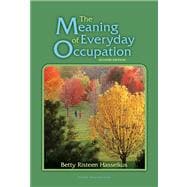The continuing emphasis of this Second Edition, by award-winning author Betty Risteen Hasselkus, PhD, is on everyday occupation as experience. The Meaning of Everyday Occupation motivates occupational therapists to think about how occupation is experienced in everyday life, to absorb the complexity of meanings imbedded in daily life, and to value the personal and social significance of everyday occupation in their own and their clients’ lives.
Chapters themes include:
• Space and place—sources of meaning in occupation
• Culture and occupation
• Occupation as a source of well-being and development
• Occupation and relationships
• Disability and occupation
• Occupation as a source of spirituality
• Creativity in occupation as a source of meaning
Throughout the Second Edition, the text focuses on the ways in which daily occupation contributes to meaning in our lives, providing a sound understanding of the daily routines and activities to which we so often give little attention. Emerging trends in occupational therapy are also examined, focusing on strengthened globalization, the movement toward populations and systems as clients, and the increasing emphasis on experiential definitions of occupation in education, practice and research.
Instructors in educational settings can visit www.efacultylounge.com for newly developed material to be used for teaching in the classroom.
The Meaning of Everyday Occupation, Second Edition is a unique and comprehensive text for the study of occupation and its implications for effective practice. Verbatim narratives from occupational therapists in practice and excerpts from the author’s life are integrated with theories of occupation and occupational science throughout the book, yielding a coherent, comprehensive and readable text on the importance of occupation to the quality of daily life.









